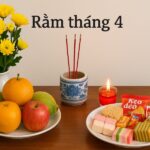The wisdom of our ancestors is a treasure trove of valuable life lessons, often shrouded in enigmatic warnings and profound insights. One such famous proverb states: “The first day of the sixth lunar month is the most fearsome.” While this may seem like a vague reminder, it encapsulates a wealth of profound life lessons.

Agricultural and Meteorological Significance
In the traditional agricultural calendar of the Vietnamese, the sixth lunar month falls during the heart of summer, marking the peak of scorching heat and the most extreme weather conditions. The first day of this month signals the onset of relentless sun, oppressive humidity, and the potential for drought, with parched earth and crops suffering the consequences. This period often coincides with the “Bà Chằn” drought, a time farmers of old considered inauspicious, believing that such extreme weather could bring about crop failure.
The first day, being the “tip of the iceberg,” sets the tone for the entire month. If the initial days are unbearably hot and sultry, it is believed that the rest of the month will follow suit, bringing a string of oppressive, challenging days. Thus, the fear associated with the first day of the sixth lunar month is not mere superstition but is rooted in the practical experiences of farmers intimately connected to the land and its cycles.
Spiritual and Cultural Perspective
In the spiritual culture of East Asia, and Vietnam in particular, the first day of the month is considered a “gateway” to the new month. Folk beliefs hold that the sixth lunar month is a time when the boundaries between the spiritual realm and the physical world blur more than usual. While it is not the “ghost month” (seventh month), the sixth month is seen as a prelude to impending spiritual fluctuations.
Our ancestors believed that the first day of the sixth month marked a noticeable rise in yin energy, foreshadowing unusual fluctuations in fortune, health, or even unexpected calamities. During this time, people tended to be more cautious and avoided undertaking significant endeavors to prevent adverse effects on their families and themselves.
Social and Historical Context
Beyond the natural and spiritual realms, this proverb also carries weight in the social sphere. Traditionally, the sixth lunar month often marked the middle of the year, a time when people had to contend with various taxes and dues. For the impoverished in the past, the first day of the sixth month signaled the beginning of a series of burdens, from paying taxes and dues to being conscripted for labor or military service.
Thus, the saying, “The first day of the sixth lunar month is the most fearsome,” can be interpreted as a lamentation of the peasant class, alluding to the impending onslaught of worries and hardships. It serves as a reminder to brace for the challenges that lie ahead.

A Cautionary Tale Forged by Experience
Regardless of the perspective—natural, spiritual, or social—the proverb carries a weighty message steeped in the wisdom of lived experience. Our ancestors, devoid of modern weather forecasting equipment or economic charts, possessed a keen observational intelligence, distilling their knowledge into unwritten laws. The first day of the sixth lunar month is one such pivotal moment in the temporal cycle, a juncture where humans, nature, and society converge in a delicate balance.
Relevance in Modern Times
Today, with advancements in science, such ancient sayings may be overlooked by some. However, for those who hold fast to tradition, this day remains a pivotal moment of caution and reflection. It serves as a reminder to respect nature, avoid its destruction, and honor the lessons passed down through generations, earned with blood, sweat, and tears.
In conclusion, the proverb, “The first day of the sixth lunar month is the most fearsome,” is a gem in the treasury of Vietnamese folk knowledge. It showcases our ancestors’ perceptiveness and depth of understanding of life’s intricacies. Regardless of interpretation, it stands as a valuable reminder to live with awareness, caution, and harmony with nature, for “heaven’s mandate, earthly advantage, and human harmony” are the very foundations of peace and prosperity.
The Ancient Wisdom: Why ‘Let the Birds Fly Past and the Fish Jump Shore’ is a Wise Philosophy
In the realm of ancient wisdom, there is a profound caution against complacency: “Beware when birds fall from the sky and fish leap at the shore.” This cryptic warning holds a deeper meaning, alluding to the dangers of becoming too comfortable or complacent, for it is when we let our guards down that fate can surprise us with unforeseen challenges.
The Ancestors’ Warning: ‘Beware of April 15th’
April 15th in the lunar calendar is not just a significant date in the spiritual culture of the Vietnamese, but it also encapsulates profound lessons passed down from our ancestors. Our forefathers have always advised the younger generations about certain things that should be avoided on this day to ward off bad luck and preserve good fortune.





































